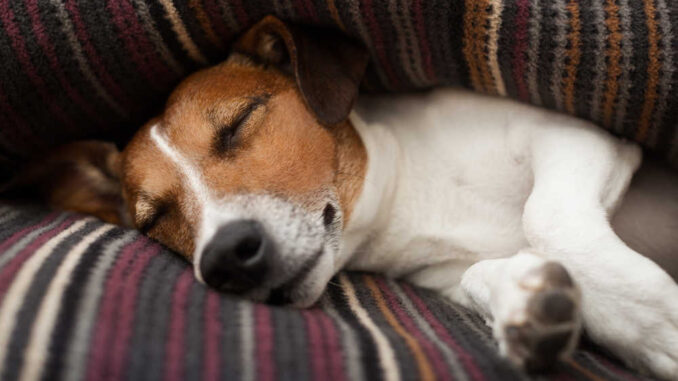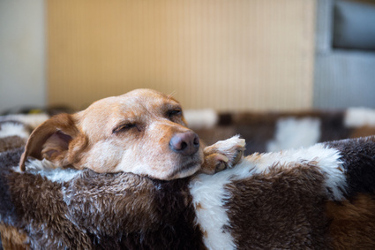
This article was updated on February 17th, 2023
Your dog breathing fast or heavy at any time can be alarming, but maybe more so at night, when your vet is closed, and you don’t know the cause. A dog’s respiratory rate and depth can change many times throughout the day for many different reasons. So, let’s hone in on those nighttime breathing issues, what you can do about them, and when they may be a problem.
Why is My Dog Breathing Fast While Sleeping? (At Night)
It’s first important to mention that smaller breeds and puppies normally have a faster breathing rate than adults and larger breeds. So, know what’s normal for your dog before you decide if they are breathing fast while sleeping at night. Now, the reasons for an increase in a dog’s breathing rate at night include:
- Heat: When the temperature climbs, so does your dog’s respiratory rate. Panting is a dog’s way of cooling off, even when sleeping. If you’re in the dead of summer or your home is on the warm side, breathing fast while sleeping may mean he needs a cooler spot to sleep. You may also notice restless sleeping as your dog tries to find a more comfortable place, he may stretch out on his belly or side, or may try to sleep near an open window.
- Dreaming: A dog’s sleep cycle is very similar to our own. Dogs even have dreams in which they may twitch, paddle his legs, whimper, or breathe faster. Most of the time this faster breathing will usually decrease once the dream is over.
- Breed: Brachycephalic dogs, such as Pugs, Bulldogs, and Shih Tzus, are prone to respiratory issues due to their facial anatomy. These respiratory issues may include breathing faster while sleeping just because they are trying to increase their air intake. These breeds may also snore and have difficulty breathing during exercise.
- Heart disease: When the heart isn’t pumping as efficiently as it should, fluid can begin to buildup in the lungs. This makes it hard for a dog to breathe, especially when he is lying down, putting pressure on the chest or causing fluid to buildup more in one side of the lungs. This may increase a dog’s breathing during sleeping to compensate for the lower air intake. Dogs with heart disease may also cough, have less energy, not want to exercise, or in extreme cases, collapse.
- Pain: Feeling pain or discomfort can increase a dog’s breathing, even while he is sleeping. This is especially true in dogs with hip issues where laying in certain positions can make hips more painful. Dogs will also show pain during the day. He may limp, hunch his back, whine or cry, or tremble as well.
- Illness: Fevers, respiratory congestion, and discomfort from illnesses may all lead to fast breathing while sleeping. Dogs may also not want to eat, have vomiting or diarrhea, cough, sneeze, or have watery eyes.
Why is My Dog Breathing Fast at Night and Not During the Day?

Some causes of breathing fast at night are going to cause the same signs during the day and some aren’t. If your dog only breathes fast while he is sleeping, being too hot or dreaming are your most likely causes. Heart failure may also be a cause, but you’re generally going to notice coughing or lethargy during the day if not fast breathing.
How Do I Know if a Dog Has a Breathing Problem?
Before you start thinking that your dog has a breathing problem, first determine if your dog is actually breathing fast. The normal sleeping respiratory rate for a dog is between 10 and 25 breaths per minute. Larger dogs will be on the lower side and smaller dogs on the higher side. You can determine his respiratory rate by counting the number of breaths he takes in 30 seconds and multiplying it by two. Anything faster than 30 breaths per minute for an extended period would be considered faster than normal.
Faster breathing doesn’t also mean that a dog has a breathing problem. He could just be excited, stressed, hot, or painful. However, labored or difficulty breathing along with that increased respiratory rate is something to worry about. If a dog is having difficulty breathing, he may be using his entire abdomen to try to get a breath. You may also hear wheezing or gurgling, and in extreme cases, his tongue may be turning dark purple or blue.
What Can I Do to Help My Dog Breathe Easy While Sleeping at Night?
Of course, how you help your dog breathe easier at night is going to depend on what is causing his faster breathing. If you decide that your dog is also having difficulty breathing, be sure to contact your veterinarian as soon as possible. If it is an issue of faster breathing only, try some of the following:
- Air purification: Some dogs have very sensitive airways that can become irritated by dust, mold, pollen, or any of the things that cause us congestion. Using an air purifier may help your dog breathe easier by removing those irritants to keep the airways clear.
- Cool it down: Consider that your dog wears a fur coat all of the time so he may need a cooler sleeping environment than you do. Provide him with a cool spot near a window, fan, or air vent, especially during hotter temperatures. Some dogs may also appreciate a cooling bed.
You’ll also want to make sure that you don’t exercise your dog right before bedtime since this can increase his body temperature as well. Give him some time to relax and get a drink of water before sending him to bed.
- Make sure your dog is healthy: Giving your dog a healthy diet and proper exercise can help him get a better night’s sleep. Reduce his anxiety and stress by giving him plenty of one-on-one attention, and allow dreams to play themselves out knowing that faster breathing during dreaming is completely normal and will subside after the dream is over. If your pup is showing other signs besides faster breathing at night, have him checked out by a vet.
When to Contact a Veterinarian For Faster Breathing While Sleeping
Most of the time faster breathing while sleeping isn’t a big concern for dogs. However, if this is something that your dog has just started doing or if it’s getting worse, don’t hesitate to call your vet. Also of concern is if your dog is having difficulty breathing, either when asleep or awake, if he has a fever, cough, vomiting, diarrhea, or is not eating. A vet should get involved if your dog sounds congested, painful, or if the faster breathing is lasting all night.
Your vet will respond by giving your pup a thorough exam. They will listen to his heart and lungs. They will check him for signs of pain especially in the hips, back, and abdomen. If your dog is a brachycephalic breed, they may also check for an elongated soft palate, smaller nostrils, and everted laryngeal saccules that can also cause breathing difficulties. X-rays may be taken to check the lungs, and they will ask you about any other symptoms.
Treatment for faster breathing while sleeping will depend on what the cause is. There’s no need for treating dreams and you’ll just want to find a cooler spot for your overly hot dog. Otherwise, your vet may do any of the following:
- Brachycephalic breeds may need surgery to fix any abnormalities that can interfere with breathing. This may include opening up the nostrils, shortening the soft palate and giving anti-inflammatories for tracheal and laryngeal inflammation. Cost can be anywhere from $200-$3,000 depending on how many issues need fixed.
- Heart disease may respond to medications to reduce the fluid buildup in the lungs and to increase the efficiency of the heart. These are lifelong medications and can cost $20-$100 per month.
- Hip or back pain in dogs may be managed with anti-inflammatories or surgery depending on where and how bad it is. Anti-inflammatories may cost $20-$100 per month while surgery may be $500-$1,500 depending on what he needs.
- Illnesses affecting your dog’s breathing come in all forms. Simple sinus congestion may be treated with antibiotics or anti-inflammatories, while pneumonia is going to need a more aggressive course of antibiotics and possibly bronchodilators. Some will even need hospitalization. Medications may cost $100-$300 or $1,000-$2,000 for serious causes that require some overnight stays.
FAQ
Do some dog breeds breathe faster than others?
Smaller breeds, puppies, and brachycephalic breeds typically breathe faster than larger breeds. This is a normal thing and generally no cause for concern, unless they are having difficulty or are showing other symptoms.
Are senior dogs more likely to breathe fast at night? Is this a cause for concern?
Just being older doesn’t necessarily mean that a dog breathes faster. However, with age comes certain conditions that can increase a dog’s breathing at night:
- Pain from arthritis,
- anxiety from dementia, or
- difficulty breathing from heart disease or
- fibrosis of the lungs
All the above conditions can cause an older pup to breathe faster at night. If your senior dog has recently started breathing faster while sleeping or is showing any other symptoms, see your veterinarian.
Related Articles:
- Your Dog Sounds Congested: What Should You Do?
- Dog Breathing Fast or Heavy (During the Day)
Disclaimer: This website's content is not a substitute for veterinary care. Always consult with your veterinarian for healthcare decisions. Read More.


Be the first to comment